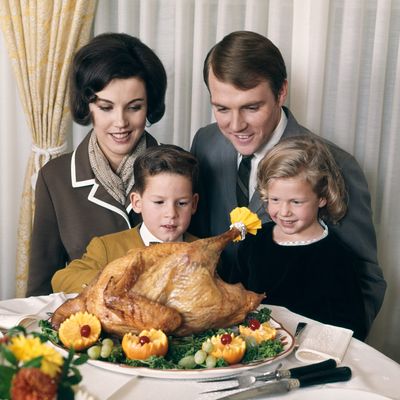
Americans will be traveling 46 million miles this Thanksgiving holiday on their way to devouring 46 million pounds of turkey and settling in to watch some seriously mediocre football. It’s the American expression of a global tradition — the feast. And like most customs that stretch back to the dawn of history, if you examine it closely enough, it starts sounding like Game of Thrones.
In a timely post at Aeon, Brian Hayden — author of The Power of Feasts: From Prehistory to the Present and emeritus professor of archaeology at Simon Fraser University in British Columbia — lays out the way they’ve worked since time out of mind. Back in the day, feasts were not unlike weddings, in that they weren’t just an opportunity to get drunk with your loved ones, but a method of securing power. Inevitably, Hayden says, village life is rife with political struggle: drought, famine, war, politics, and other vagaries of existence that inevitably visit your life. So just as you need to have friends at work to survive the modern office, you need allies to weather the (sometimes literal) slings and arrows of traditional life.
Feasts could take up to ten years of saving for, he says, so if you came, you owed. This, he says, was the essential function of the traditional feast: By accepting the invitation, you were implying that you would reciprocate in turn. “Feasting is the way that people created and maintained reliable social support networks — and they are effective in this because of the reciprocal debts they entailed,” he says. And like the Mafia, once you get pulled into such a system of debts, it’s nearly impossible to get out — and if you didn’t reciprocate, it could mean your life.
In this way, feasts were also a lever by which to cultivate power. They were a technology, you might say, that created economically based hierarchies: being able to host more feasts meant that you would gather more debts, assimilating and perpetuating power. So the surpluses that your land and whatever other holdings you had produced allowed you to invite more people for feasts, yielding bigger networks of power and greater stability in a community.
Indeed, Hayden argues, the only time animals were probably eaten back in the day was in the context of sacrifice and then feasting — they were a status symbol that cemented status. In this way, he argues, feasts wove together the social fabric. “Far different from the gustatory and social entertainment of modern feasting, traditional feasts were entertainment with ulterior motives and binding debts that have produced the kind of surplus-based industrial society with all its inequalities that much of the world lives in today,” Hayden writes. It’s not as much the case that you are what you eat, but whom you eat with.




